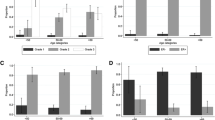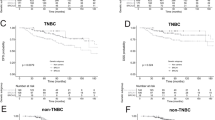Abstract
Recently, the number of studies on male breast cancer (MBC) has been increasing. However, as MBC is a rare disease there are difficulties to undertake studies to identify specific MBC subgroups. At present, it is still largely unknown whether BRCA-related breast cancer (BC) in men may display specific characteristics as it is for BRCA-related BC in women. To investigate the clinical–pathologic features of MBC in association with BRCA mutations we established a collaborative Italian Multicenter Study on MBC with the aim to recruit a large series of MBCs. A total of 382 MBCs, including 50 BRCA carriers, were collected from ten Italian Investigation Centres covering the whole country. In MBC patients, BRCA2 mutations were associated with family history of breast/ovarian cancer (p < 0.0001), personal history of other cancers (p = 0.044) and contralateral BC (p = 0.001). BRCA2-associated MBCs presented with high tumor grade (p = 0.001), PR− (p = 0.026) and HER2+ (p = 0.001) status. In a multivariate logistic model BRCA2 mutations showed positive association with personal history of other cancers (OR 11.42, 95 % CI 1.79–73.08) and high tumor grade (OR 4.93, 95 % CI 1.02–23.88) and inverse association with PR+ status (OR 0.19, 95 % CI 0.04–0.92). Based on immunohistochemical (IHC) profile, four molecular subtypes of MBC were identified. Luminal A was the most common subtype (67.7 %), luminal B was observed in 26.5 % of the cases and HER2 positive and triple negative were represented by 2.1 % and 3.7 % of tumors, respectively. Intriguingly, we found that both luminal B and HER2 positive subtypes were associated with high tumor grade (p = 0.003 and 0.006, respectively) and with BRCA2 mutations (p = 0.016 and 0.001, respectively). In conclusion, our findings indicate that BRCA2-related MBCs represent a subgroup of tumors with a peculiar phenotype characterized by aggressive behavior. The identification of a BRCA2-associated phenotype might define a subset of MBC patients eligible for personalized clinical management.
Similar content being viewed by others
References
Speirs V, Shaaban AM (2009) The rising incidence of male breast cancer. Breast Cancer Res Treat 115(2):429–430
Jemal A, Siegel R, Xu J, Ward E (2010) Cancer statistics. CA Cancer J Clin 60(5):277–300
Anderson WF, Jatoi I, Tse J, Rosenberg PS (2010) Male breast cancer: a population-based comparison with female breast cancer. J Clin Oncol 28:232–239
Anderson WF, Althuis MD, Brinton LA, Devesa SS (2004) Is male breast cancer similar or different than female breast cancer? Breast Cancer Res Treat 83(1):77–86
Ottini L, Rizzolo P, Zanna I, Falchetti M, Masala G, Ceccarelli K, Vezzosi V, Gulino A, Giannini G, Bianchi S, Sera F, Palli D (2009) BRCA1/BRCA2 mutation status and clinical–pathologic features of 108 male breast cancer cases from Tuscany: a population-based study in central Italy. Breast Cancer Res Treat 116(3):577–586
Fentiman IS, Fourquet A, Hortobagyi GN (2006) Male breast cancer. Lancet 367:595–604
Vargas AC, Reis-Filho JS, Lakhani SR (2011) Phenotype-genotype correlation in familial breast cancer. J Mammary Gland Biol Neoplasia 16(1):27–40
Honrado E, Osorio A, Palacios J, Benitez J (2006) Pathology and gene expression of hereditary breast tumors associated with BRCA1, BRCA2 and CHEK2 gene mutations. Oncogene 25(43):5837–5845
Bane AL, Beck JC, Bleiweiss I, Buys SS, Catalano E, Daly MB, Giles G, Godwin AK, Hibshoosh H, Hopper JL, John EM, Layfield L, Longacre T, Miron A, Senie R, Southey MC, West DW, Whittemore AS, Wu H, Andrulis IL, O’Malley FP (2007) BRCA2 mutation-associated breast cancers exhibit a distinguishing phenotype based on morphology and molecular profiles from tissue microarrays. Am J Surg Pathol 31(1):121–128
Da Silva L, Lakhani SR (2010) Pathology of hereditary breast cancer. Mod Pathol 23(Suppl 2):S46–S51
Mavaddat N, Barrowdale D, Andrulis IL, Domchek SM, Eccles D, Nevanlinna H, Ramus SJ, Spurdle A, Robson M, Sherman M, Mulligan AM, Couch FJ, Engel C, McGuffog L, Healey S, Sinilnikova OM, Southey MC, Terry MB, Goldgar D, O’Malley F, John EM, Janavicius R, Tihomirova L, Hansen TV, Nielsen FC, Osorio A, Stavropoulou A, Benítez J, Manoukian S, Peissel B, Barile M, Volorio S, Pasini B, Dolcetti R, Putignano AL, Ottini L, Radice P, Hamann U, Rashid MU, Hogervorst FB, Kriege M, van der Luijt RB; for HEBON, Peock S, Frost D, Evans DG, Brewer C, Walker L, Rogers MT, Side LE, Houghton C; for EMBRACE, Weaver J, Godwin AK, Schmutzler RK, Wappenschmidt B, Meindl A, Kast K, Arnold N, Niederacher D, Sutter C, Deissler H, Gadzicki D, Preisler-Adams S, Varon-Mateeva R, Schönbuchner I, Gevensleben H, Stoppa-Lyonnet D, Belotti M, Barjhoux L; for GEMO Study Collaborators, Isaacs C, Peshkin BN, Caldes T, de la Hoya M, Cañadas C, Heikkinen T, Heikkilä P, Aittomäki K, Blanco I, Lazaro C, Brunet J, Agnarsson BA, Arason A, Barkardottir RB, Dumont M, Simard J, Montagna M, Agata S, D’Andrea E, Yan M, Fox S; for kConFab Investigators, Rebbeck TR, Rubinstein W, Tung N, Garber JE, Wang X, Fredericksen Z, Pankratz VS, Lindor NM, Szabo C, Offit K, Sakr R, Gaudet MM, Singer CF, Tea MK, Rappaport C, Mai PL, Greene MH, Sokolenko A, Imyanitov E, Toland AE, Senter L, Sweet K, Thomassen M, Gerdes AM, Kruse T, Caligo M, Aretini P, Rantala J, von Wachenfeld A, Henriksson K; for SWE-BRCA Collaborators, Steele L, Neuhausen SL, Nussbaum R, Beattie M, Odunsi K, Sucheston L, Gayther SA, Nathanson K, Gross J, Walsh C, Karlan B, Chenevix-Trench G, Easton DF, Antoniou AC; for the Consortium of Investigators of Modifiers of BRCA1/2 (2012) Pathology of breast and ovarian cancers among BRCA1 and BRCA2 mutation carriers: results from the consortium of investigators of modifiers of BRCA1/2 (CIMBA). Cancer Epidemiol Biomarkers Prev 21(1):134–147
Ge Y, Sneige N, Eltorky MA, Wang Z, Lin E, Gong Y, Guo M (2009) Immunohistochemical characterization of subtypes of male breast carcinoma. Breast Cancer Res 11:R28
Kornegoor R, Verschuur-Maes AH, Buerger H, Hogenes MC, de Bruin PC, Oudejans JJ, van der Groep P, Hinrichs B, van Diest PJ (2012) Molecular subtyping of male breast cancer by immunohistochemistry. Mod Pathol 25(3):398–404
Shaaban AM, Ball GR, Brannan RA, Cserni G, Benedetto AD, Dent J, Fulford L, Honarpisheh H, Jordan L, Jones JL, Kanthan R, Maraqa L, Litwiniuk M, Mottolese M, Pollock S, Provenzano E, Quinlan PR, Reall G, Shousha S, Stephens M, Verghese ET, Walker RA, Hanby AM, Speirs V (2011) A comparative biomarker study of 514 matched cases of male and female breast cancer reveals gender-specific biological differences. Breast Cancer Res Treat. doi:10.1007/s10549-011-1856-9
Ottini L, Masala G, D’Amico C, Mancini B, Saieva C, Aceto G, Gestri D, Vezzosi V, Falchetti M, De Marco M, Paglierani M, Cama A, Bianchi S, Mariani-Costantini R, Palli D (2003) BRCA1 and BRCA2 mutation status and tumor characteristics in male breast cancer: a population-based study in Italy. Cancer Res 63:342–347
Bianchi S, Palli D, Falchetti M, Saieva C, Masala G, Mancini B, Lupi R, Noviello C, Omerovic J, Paglierani M, Vezzosi V, Alimandi M, Mariani-Costantini R, Ottini L (2006) ErbB-receptors expression and survival in breast carcinoma: a 15-year follow-up study. J Cell Physiol 206:702–708
Papi L, Putignano AL, Congregati C, Zanna I, Sera F, Morrone D, Falchetti M, Turco MR, Ottini L, Palli D, Genuardi M (2009) Founder mutations account for the majority of BRCA1-attributable hereditary breast/ovarian cancer cases in a population from Tuscany,Central Italy. Breast Cancer Res Treat 117(3):497–504
Giordano SH, Cohen DS, Buzdar AU, Perkins G, Hortobagyi GN (2004) Breast carcinoma in men: a population-based study. Cancer 101(1):51–57
Satram-Hoang S, Ziogas A, Anton-Culver H (2007) Risk of second primary cancer in men with breast cancer. Breast Cancer Res 9(1):R10
Arslan UY, Oksüzoğlu B, Ozdemir N, Aksoy S, Alkış N, Gök A, Kaplan MA, Gümüş M, Berk V, Uncu D, Baykara M, Colak D, Uyetürk U, Türker I, Işıkdoğan A (2011) Outcome of non-metastatic male breast cancer: 118 patients. Med Oncol. doi:10.1007/s12032-011-9978-9
Nahleh ZA, Srikantiah R, Safa M, Jazieh AR, Muhleman A, Komrokji R (2007) Male breast cancer in the veterans affairs population: a comparative analysis. Cancer 109(8):1471–1477
Mitra AV, Bancroft EK, Barbachano Y, Page EC, Foster CS, Jameson C, Mitchell G, Lindeman GJ, Stapleton A, Suthers G, Evans DG, Cruger D, Blanco I, Mercer C, Kirk J, Maehle L, Hodgson S, Walker L, Izatt L, Douglas F, Tucker K, Dorkins H, Clowes V, Male A, Donaldson A, Brewer C, Doherty R, Bulman B, Osther PJ, Salinas M, Eccles D, Axcrona K, Jobson I, Newcombe B, Cybulski C, Rubinstein WS, Buys S, Townshend S, Friedman E, Domchek S, Ramon Y Cajal T, Spigelman A, Teo SH, Nicolai N, Aaronson N, Ardern-Jones A, Bangma C, Dearnaley D, Eyfjord J, Falconer A, Grönberg H, Hamdy F, Johannsson O, Khoo V, Kote-Jarai Z, Lilja H, Lubinski J, Melia J, Moynihan C, Peock S, Rennert G, Schröder F, Sibley P, Suri M, Wilson P, Bignon YJ, Strom S, Tischkowitz M, Liljegren A, Ilencikova D, Abele A, Kyriacou K, van Asperen C, Kiemeney L; IMPACT Study Collaborators, Easton DF, Eeles RA (2011) Targeted prostate cancer screening in men with mutations in BRCA1 and BRCA2 detects aggressive prostate cancer: preliminary analysis of the results of the IMCACT study. BJU Int 107(1):28–39
Acknowledgments
The study was supported by a grant from Associazione Italiana per la Ricerca sul Cancro (AIRC IG 8713).
Conflict of interest
The authors declare that they have no conflict of interest.
Author information
Authors and Affiliations
Corresponding author
Electronic supplementary material
Below is the link to the electronic supplementary material.
Rights and permissions
About this article
Cite this article
Ottini, L., Silvestri, V., Rizzolo, P. et al. Clinical and pathologic characteristics of BRCA-positive and BRCA-negative male breast cancer patients: results from a collaborative multicenter study in Italy. Breast Cancer Res Treat 134, 411–418 (2012). https://doi.org/10.1007/s10549-012-2062-0
Received:
Accepted:
Published:
Issue Date:
DOI: https://doi.org/10.1007/s10549-012-2062-0




